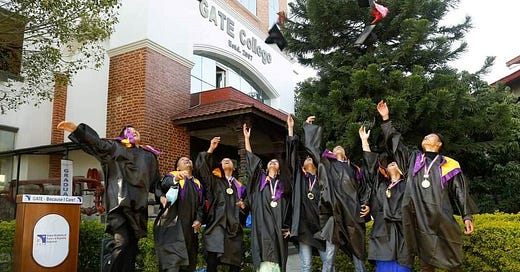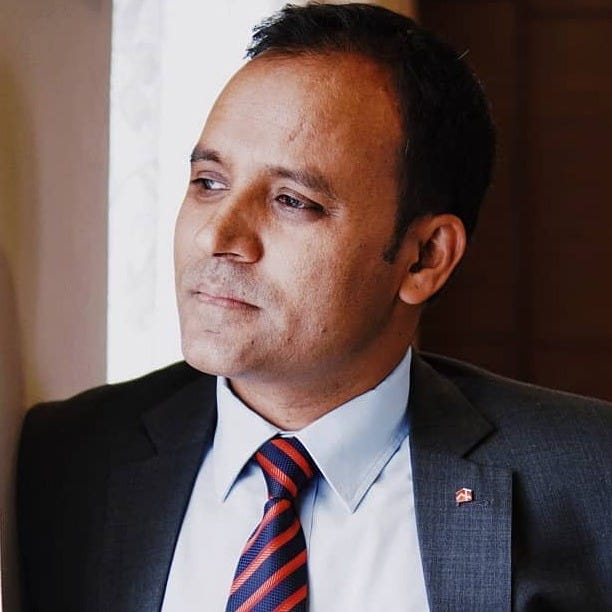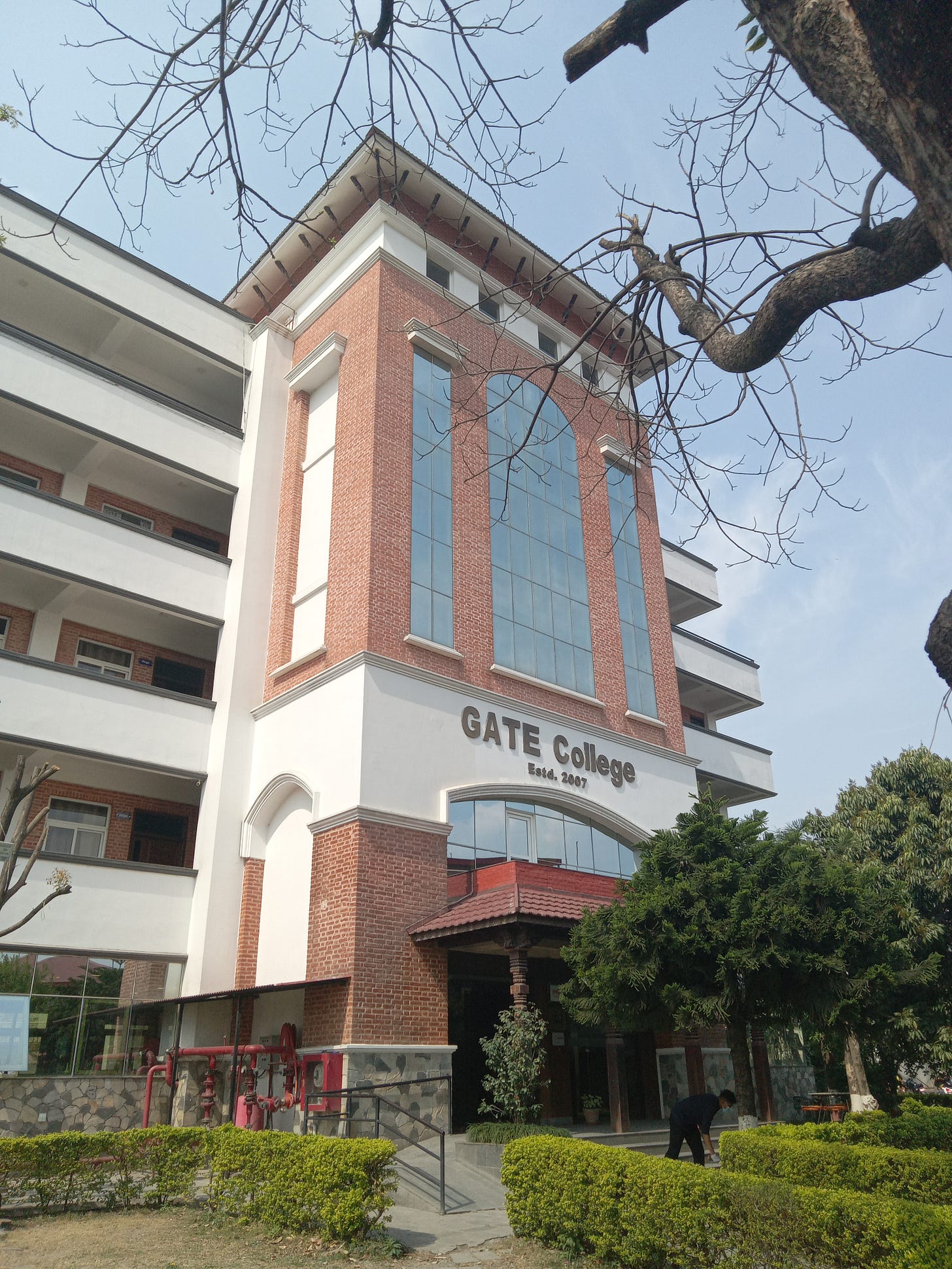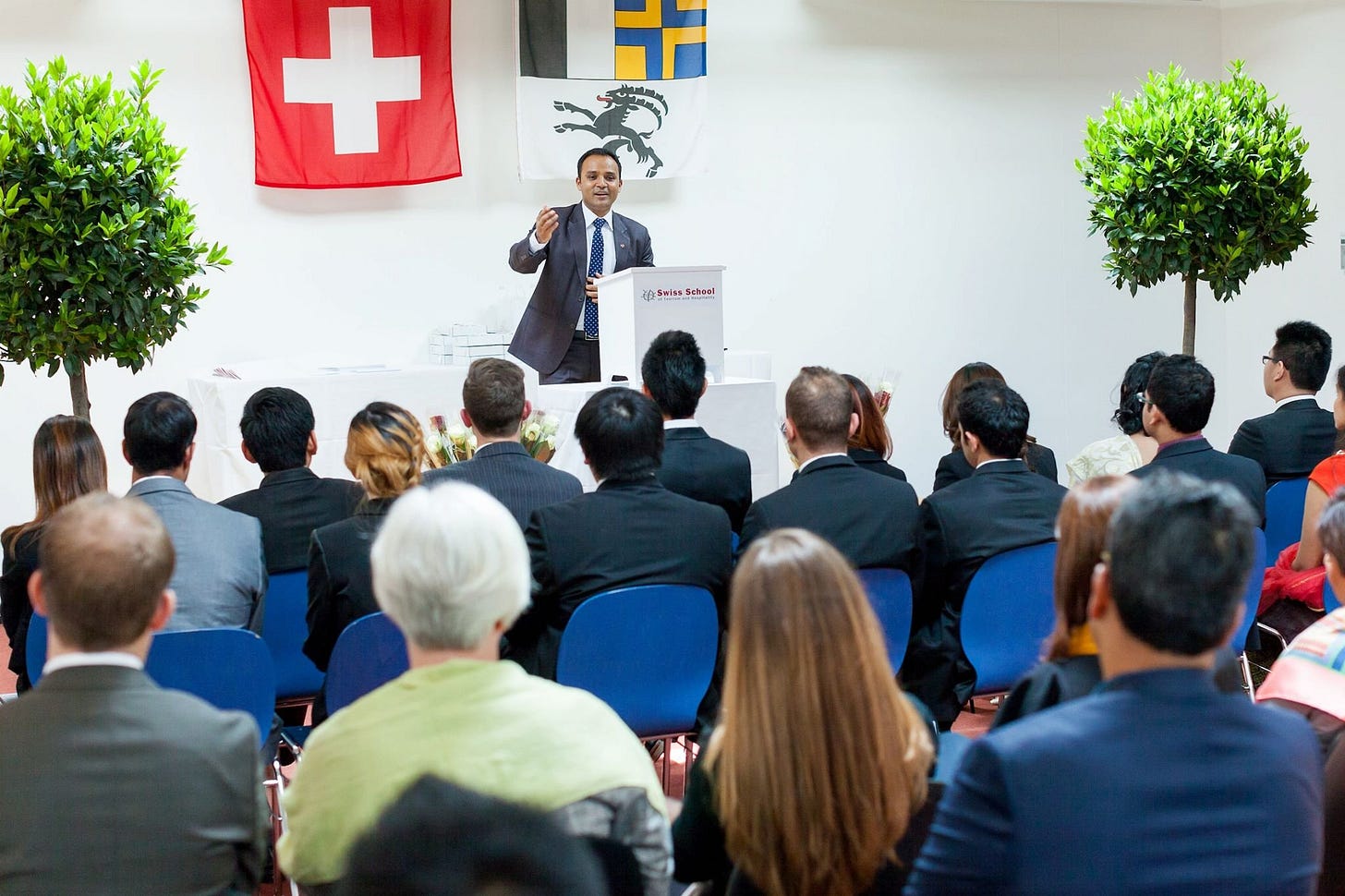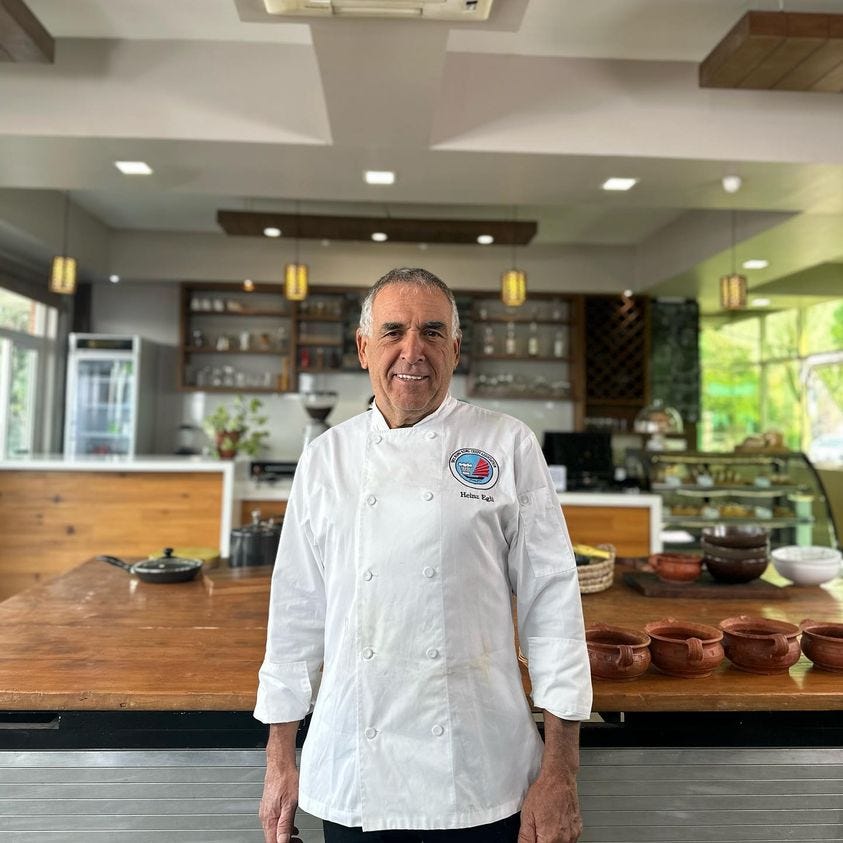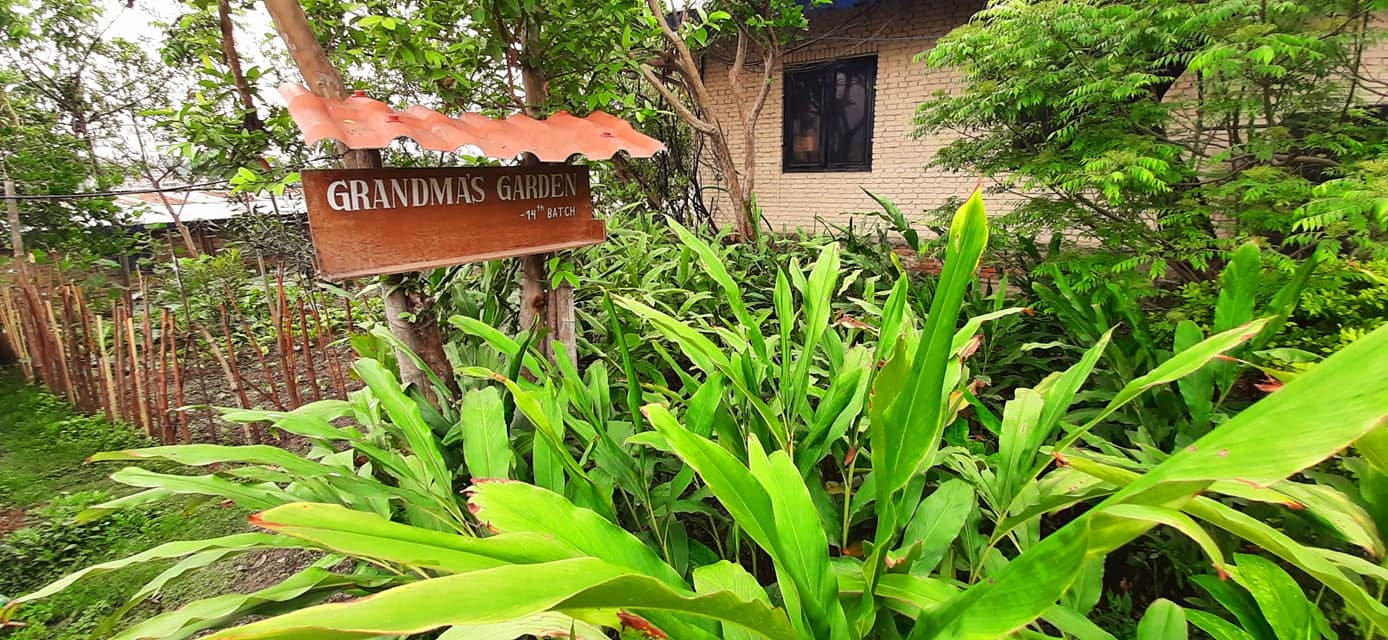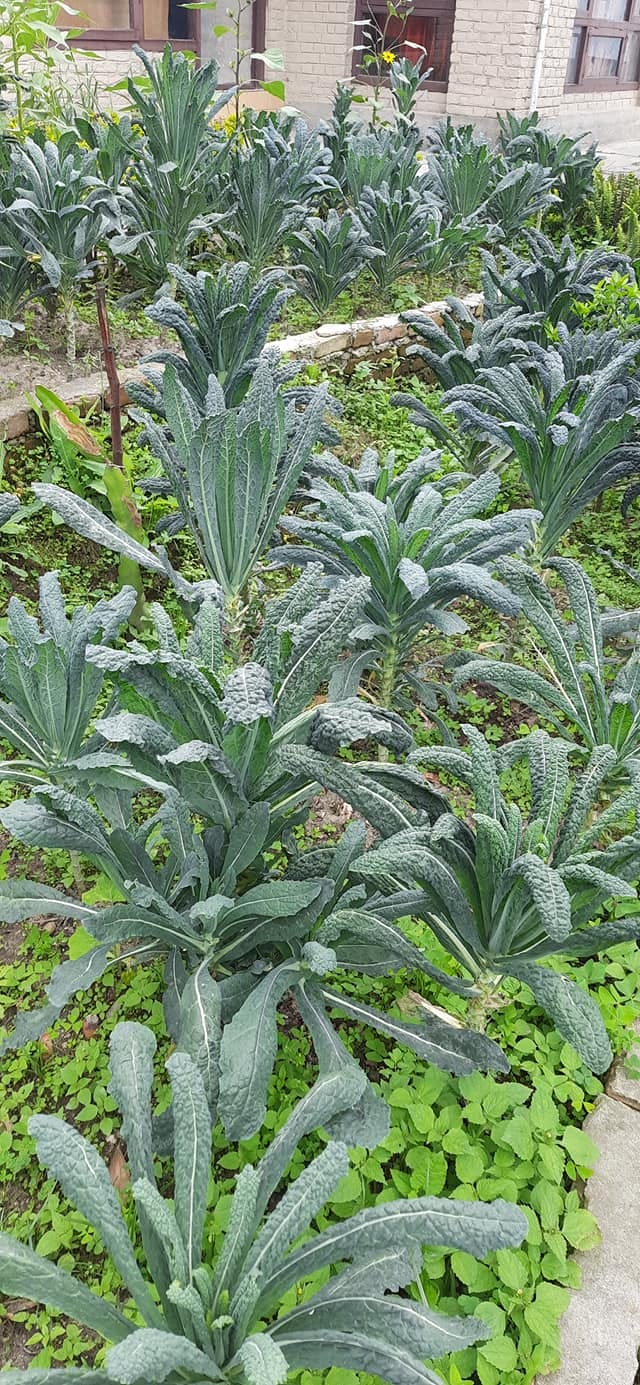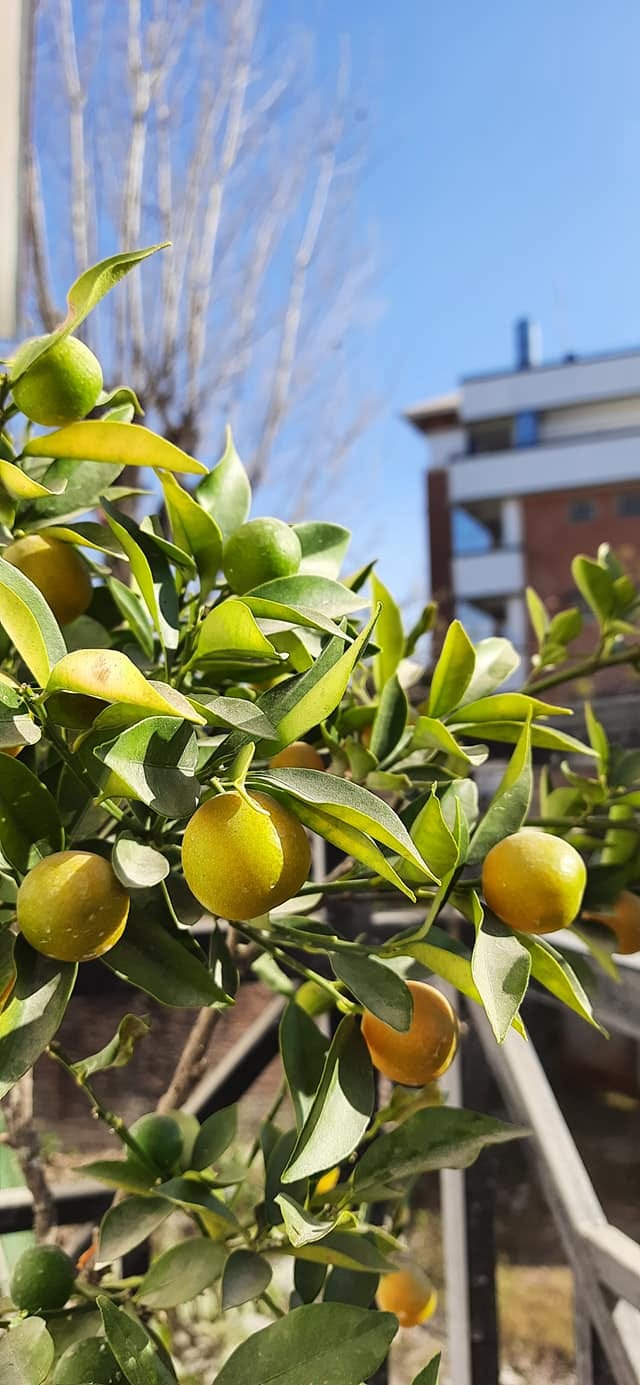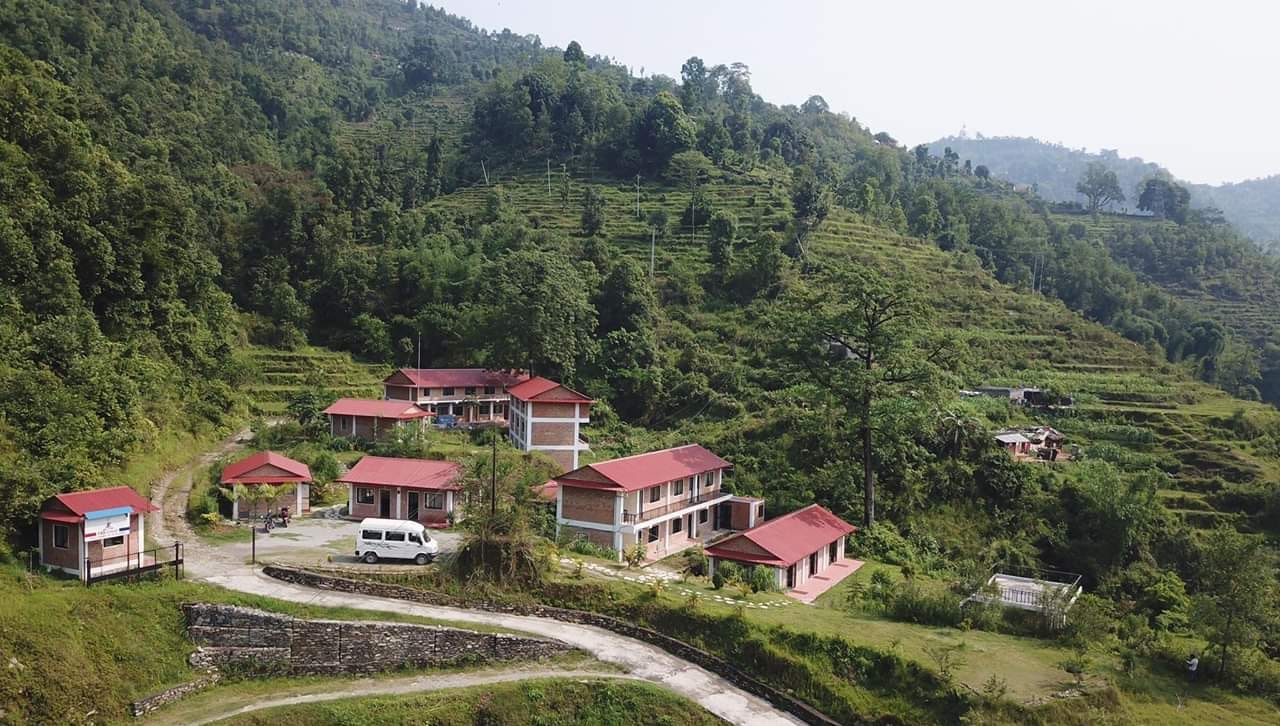Sustainability through Compassionate Education
This is the 1st Article in the Sustainability Series
I interviewed Mr. Khem Lakai, the Founder and President of GATE College in Kathmandu.
The Global Academy of Tourism and Hospitality Education (GATE) is a college located in Kathmandu, Nepal. It is a leading educational institution in the tourism industry, a key component of Nepal’s economy. Globally, the tourism sector is a multi-trillion-dollar industry. Graduates from GATE perform key roles in the industry both in Nepal and abroad, such as owners, managers, chefs, baristas, and other roles. Their training at GATE not only provides them the tools to grow into critical personnel across a wide variety of occupations in the industry, but it also teaches them how to do so in an environmentally sustainable way.
GATE College’s main hall.
Environmental sustainability in every sector is increasingly becoming a key concern—and necessarily so. The auto industry has focused on producing higher numbers of ever-more-efficient electric vehicles, airlines are working to adopt greener fuels, sustainable energy occupies a larger proportion of many countries’ electrical grids every year, and food production continues to evolve into more sustainable methods, to name a few.
Like all major efforts, improved sustainability depends upon those emerging into their respective fields to imagine and implement it. The tourism and hospitality industry offers unique opportunities to engage in and capitalize on sustainability practices. GATE College provides a sterling example of how this can be done. As other industries revolutionize their practices, educational institutions globally can and should be shifting in this direction as well.
Founded in 2007, GATE College once resided in the midst of a relatively rural part of Kathmandu. In less than two decades, however, the landscape has vastly changed. The college is now surrounded by closely cramped buildings of all purposes, with nary an open space in sight.
The campus itself added its flagship building in 2015 to accommodate growing numbers of students, guests, instructors, and events. Despite this, Founder and President Khem Lakai and his devoted team have turned the campus into something of a utopia of sustainability, growing an extraordinary amount of its own food, herbs and spices. GATE’s production capacity is at self-sustaining levels for many crops, and thus allows it to rely much less heavily on externally grown products.
Students at GATE learning about cultivation
Averaging a total of about 300 students in attendance per year, GATE graduates roughly 200 of those at a time, who go on to a variety of careers in the hospitality field. Students earn degrees and certifications in culinary, baking, coffee-making, management, and other jobs.
Thanks to visionary educators in Nepal, and forward thinking universities such as Kathmandu University, many students now have opportunities in hospitality education, including apprenticeships, which prepare them for work immediately upon completion of their program. Because GATE currently works with colleges in Switzerland, the Netherlands, Japan, and Australia, most students find the chance to travel as exchange students for further education, or to work as interns in those places.
The programs with which these students get involved are some of the elite programs in hospitality across the world, such as the TAFE program in Australia—which gives students access to top global qualifications; the EHL-certified Swiss BIHM program—which is a renowned name in the hospitality industry; and exchange programs with top universities elsewhere across the globe. GATE is also affiliated with the Swiss Hotel Association, and sister schools Hotel School Thun, Passage and EHL Lausanne. These are further possible avenues in Switzerland with which students can collaborate.
To succeed in these programs, students need a 21st century mindset, a futuristic and humanistic approach, with sustainability at heart. After all, they will serve as ambassadors of both Nepal and of sustainability. This is the core of the teaching philosophy at GATE. Mr. Lakai himself leads by example, serving as the global ambassador of hospitality for Nepal.
Mr. Lakai giving a speech to the Swiss Association Schools.
Mr. Lakai also works to give his students exposure to world famous brands in the industry, such as Anantara, Marriott, Hyatt, Hilton, Accor, Radisson, Fraiser Suites, Centra, and IHG, among others. This allows students to meet those who are at the top of the field, so they can see some of their goals embodied in real people.
Famous personalities who have come to GATE include Master Chefs like Santosh Shah, Heinz Egli, David Forster, Stefan Herzog, Reto Alex Weber, Michael Staedtlander, Fritz Gross, Maneuel Berganza, Urs Besmer, Upendra Sagar Joshi, and Mayank Garg. In addition, because GATE often hosts important events, students learn how to navigate among diplomats, ambassadors, highly-placed government officials and others. This prepares them to work in any place, whether three star or five.
Heinz Egli, Founder and President of the Hong Kong Chef’s Association at GATE College
GATE College’s philosophy developed from Mr. Lakai’s own upbringing. Hailing from a small village in Nepal, his parents were farmers. As a matter of survival and character-building, they taught him how to understand planting and cultivating crops, working with a variety of different items across the seasons, and most importantly about being self-sufficient.
Mr. Lakai realized early on how good self-sustainability felt. He also learned how to avoid food borne illness, which back in those days was a serious problem in many parts of the country. This hit home for him personally as, at just age 11, he lost his mother to a food borne illness. As GATE began to grow, Mr. Lakai never forgot the principles from his youth, and forged them into the central philosophy of his educational program.
He recognized the fertility of the soil and particularly viable climate for farming right on GATE’s campus, and sought to capitalize on these conditions as a key life-lesson for his students. Especially after the pandemic, the whole world began to realize how important health is and how huge a part of that is what you eat.
One of the several gardens tucked around GATE’s campus
GATE grows a remarkable array of different plants, from grapes, figs, pomegranates, dragon fruits, bananas, peaches, plumbs, passion fruit, and cherry tomatoes, to asparagus, Brussels sprouts, celery, large cardamom, ginger, curry leaves, macadamia, wild nuts, olives, avocados, Galangal, Lemongrass, and Chinese plantains. In total, GATE produces almost 50 different fruits, vegetables, lettuces, herbs, and spices.
Kale plants on GATE’s campus
All people at GATE participate in the agricultural process from drivers and housekeeping staff, to students, chefs, managers, and even guests. GATE does not sell anything it grows; the idea is to inspire students to understand the value of the Earth, how the soil turns into nourishment, and how to connect with it for survival and personal growth.
Students learn about the seasons and the types of things that grow properly and when. GATE also instills in students the habit of eating fresh, local, and healthy. The difficulty of planting and cultivating crops makes students conscious of food waste and how to compost, and it creates a caring character in them about the environment.
GATE teaches curating seeds to saplings—especially coffee, passion fruits and Macadamia nuts—which are then distributed across Nepal directly to the farmers at no cost. This teaches students to value such traits while working in hospitality, but also in their personal lives.
Winter fruits in GATE’s gardens
Mr. Lakai loves taking guests around the campus. They are almost always impressed by the variety and volume of crops. Many think GATE makes it look easy. This of course is not true. It requires persistence and attention to detail. GATE’s program helps students realize that self-sufficiency can be done even on a small plot of land, but succeeding requires the wise use of every available inch of space.
When it comes to education, Mr. Lakai believes farmers and teachers are essentially the same. The job of both is to nurture a thing—students’ minds or plants to grow. Passionate teachers can make ‘ordinary’ students realize the incredible things they can do, from which they will turn into responsible, skilled, and all-around wonderful human beings. Teaching farming practices is one method of helping students attain this realization. After all, hospitality is about spreading goodness. It is a healing profession. It is about nurturing the soul and physical health. And Mr. Lakai’s efforts do not stop there.
Gate’s just celebrated its 17th anniversary. Click the above video or see more at their YouTube page.
In nearby Pokhara, a city about 150 km from Kathmandu, GATE hosts a green campus that teaches specific hospitality skills, a vocational school. Like GATE Kathmandu, students at the Pokhara campus also grow fruits, vegetables, and mushrooms, and maintain a flock of chickens and ducks. They also make essential oils. Students train on baking, dairy, laundry, and housekeeping. The goal there is to educate them in multi-disciplinary skills.
What is most remarkable about GATE Pokhara is that the students primarily come from rural villages. GATE Pokhara offers students the unique chance at employment in industries other than village farming, and it allows many of them to see the world outside of rural Nepal—an opportunity few from those regions ever get.
GATE’s campus in Pokhara
In concluding, Mr. Lakai said to me, “I believe that our resources are limited. So, we need to value each inch of land as our lives depend on that.” He added, “Every single human deserves to live a healthy life, and good food is the foundation. Hospitality is a healing profession, therefore, it is highly important how we nurture our next generations; love, kindness, and compassion are only possible if we care for each other.” GATE is fostering a unique educational environment to emphasize these exact sentiments.
***
I am a Certified Forensic Computer Examiner, Certified Crime Analyst, Certified Fraud Examiner, and Certified Financial Crimes Investigator with a Juris Doctor and a Master’s degree in history. I spent 10 years working in the New York State Division of Criminal Justice as Senior Analyst and Investigator. Today, I teach Cybersecurity, Ethical Hacking, and Digital Forensics at Softwarica College of IT and E-Commerce in Nepal. In addition, I offer training on Financial Crime Prevention and Investigation. I am also Vice President of Digi Technology in Nepal, for which I have also created its sister company in the USA, Digi Technology America, LLC. We provide technology solutions for businesses or individuals, including cybersecurity, all across the globe. I was a firefighter before I joined law enforcement and now I currently run a non-profit that uses mobile applications and other technologies to create Early Alert Systems for natural disasters for people living in remote or poor areas.
Visit GATE College’s website, Facebook, Instagram or YouTube.

